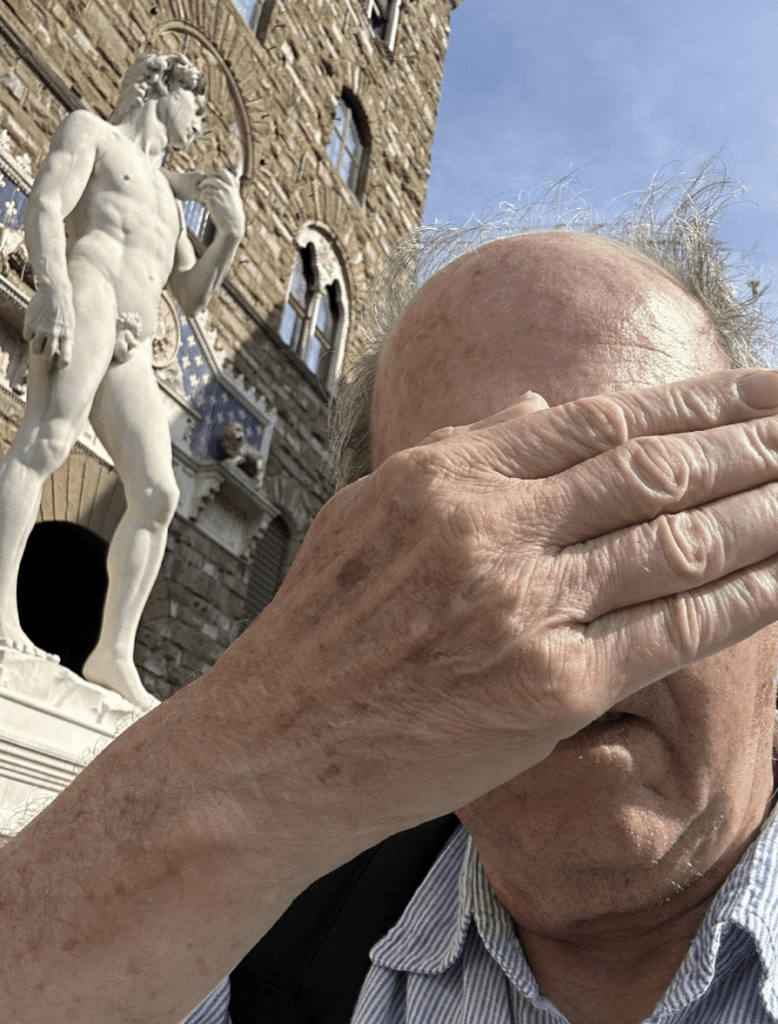
June 26, 2023 By Michael Weymouth
Recently a charter school principal in Tallahassee, Florida was forced to resign after several parents complained that a sixth-grade Renaissance art history lesson was pornographic. The issue, it seems, was a photo of Michelangelo’s sculpture of David, which showed his genitals, a not uncommon feature in Renaissance art, which unashamedly glorified the human body. The larger-than-life statue of the young Bible character holds a slingshot over his shoulder which he used to slay the giant Goliath. Most significantly, the David was created at the beginning of the Renaissance, a period of enlightenment that set western civilization on a new course. The sculpture symbolized the aspirations and hopes of that dawning era, no doubt one of the lessons the art teacher wanted to impress on the sixth-graders. Unfortunately the presence of David’s penis was of greater concern to the offended parents.
This incident may seem a bit silly for most of us, but it is also an example of the perils of populism.
Historically populism was referred to as “direct democracy,” where the people had an unfiltered voice in running the government, versus affecting change through elected representatives. For a government that purported to be of, by and for the people, direct democracy would seem to make sense. But a great deal of thought was given to this subject at the founding of our country. In an article in National Affairs, Madison and the Perils of Populism, George Thomas, the Wohlford Professor of American Political Institutions at Claremont McKenna College, wrote in 2016 about the rise in populism that led to the election of Donald Trump. https://nationalaffairs.com/publications/detail/madison-and-the-perils-of-populism Thomas provides an extensive explanation as to why the Founders were opposed to populism, believing that elected political officials were not merely to act as a mouthpiece of the citizenry, but to see further than ordinary citizens: to refine and enlarge the public views, to have the wisdom to “discern the true interest of their country,” and to do so even if it meant acting against popular views. Representative democracy was preferable to direct democracy precisely because it was designed to place those of superior political understanding and judgment in office.
Because the passions of the people could be openly played upon, Madison concluded that it was often the case that a “single orator would be seen to rule with as complete a sway as if a scepter had been placed in his single hand.” No better example of this exists than Donald Trump’s statement early in his campaign, “I alone can fix it,” indicating that Donald Trump had little understanding of how the democratic process worked, or perhaps just as significantly, how his supporters believed democracy worked.
Thomas wrote that Madison believed that we should guard against this type of would-be demagogue who uses populism’s lure to flatter the prejudices of the people in order to gain power. Unfortunately, Donald Trump has perfected this skill to a black art, and Florida governor Ron DeSantis is not far behind, as he is presently carrying the populism banner from Florida to the country at large.
DeSantis set the aforementioned Florida incident in motion by appealing to populist concerns about “wokeness,” which among other things encouraged the banning of books school children had access to. If even one parent complained about a book’s content, especially having to do with LGBTQ issues or critical race theory (CRT,) or other woke issues, that book would be banned. DeSantis claimed that parents should have a say in what their kids learned in school, even if their actions contradicted advice from education professionals.
My conservative friends say, “no big deal,” this was just an isolated incident in an attempt to downplay it. In fact, like the crack in the foundation of a new building that would one day lead to its downfall, the incident is an example of what the country would be subjected to if populists are allowed to control our democracy. The polarization we are presently experiencing in our nation is a direct result of politicians giving voice to populist sentiments and to the flood of misinformation that underpins those sentiments.
It is noteworthy that the block of marble the David was hewn from was rejected by all the sculptors of the day because of its odd configuration. Only Michelangelo saw the sculpture within. What we need today are politicians who have that same vision of the possibilities within our democracy. And it should not be lost on us that the Italians did not refer to that period of history as the Renaissance, they used the term Svegliato, which translated means “woke.”

